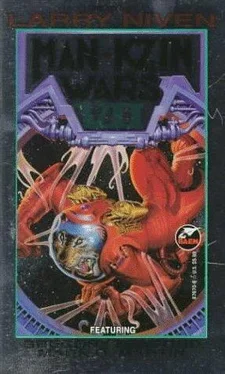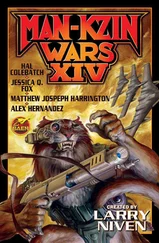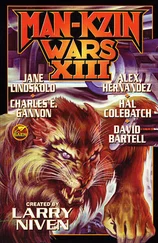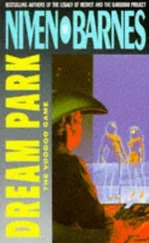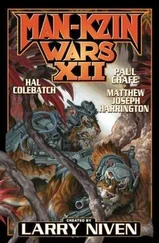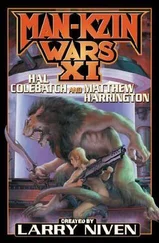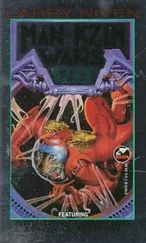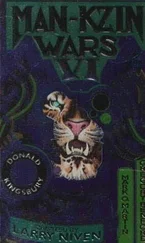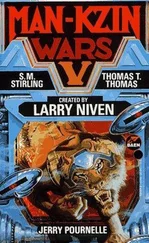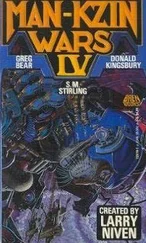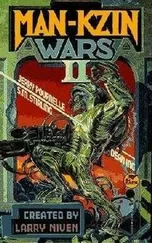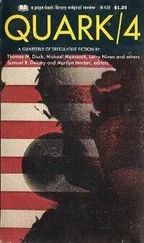Larry Niven - The Man-Kzin Wars 07
Здесь есть возможность читать онлайн «Larry Niven - The Man-Kzin Wars 07» весь текст электронной книги совершенно бесплатно (целиком полную версию без сокращений). В некоторых случаях можно слушать аудио, скачать через торрент в формате fb2 и присутствует краткое содержание. Жанр: Космическая фантастика, на английском языке. Описание произведения, (предисловие) а так же отзывы посетителей доступны на портале библиотеки ЛибКат.
- Название:The Man-Kzin Wars 07
- Автор:
- Жанр:
- Год:неизвестен
- ISBN:нет данных
- Рейтинг книги:4 / 5. Голосов: 1
-
Избранное:Добавить в избранное
- Отзывы:
-
Ваша оценка:
- 80
- 1
- 2
- 3
- 4
- 5
The Man-Kzin Wars 07: краткое содержание, описание и аннотация
Предлагаем к чтению аннотацию, описание, краткое содержание или предисловие (зависит от того, что написал сам автор книги «The Man-Kzin Wars 07»). Если вы не нашли необходимую информацию о книге — напишите в комментариях, мы постараемся отыскать её.
The Man-Kzin Wars 07 — читать онлайн бесплатно полную книгу (весь текст) целиком
Ниже представлен текст книги, разбитый по страницам. Система сохранения места последней прочитанной страницы, позволяет с удобством читать онлайн бесплатно книгу «The Man-Kzin Wars 07», без необходимости каждый раз заново искать на чём Вы остановились. Поставьте закладку, и сможете в любой момент перейти на страницу, на которой закончили чтение.
Интервал:
Закладка:
There was an oversized belt with pockets, and small metal artifacts. They and the computer-thing seemed to have come from the same shop and they had what looked like homogeneous power-couplings. On these too, and on the big knife, the bonelike design was repeated.
"There's also the old man's book," said Vaughn-Nguyen. "He wrote it for the family. There's a chapter on the Tiger-Man in it. Grandfather read it to us when I was a child. I think that was one of the last times we took the skin out of the chest. I don't imagine you can get copies of it anymore. It must have been out of print for a long time, and I don't think it was ever electronically transcribed.”
He was right there. You couldn't get a large number of those old books. There were old mine-tunnels full of them, veins of cellulose running through Earth's geological strata. There were whole construction industries, even space industries, whose main products came from pulped and highly compressed paper. Some of our best and most expensive natural-grown food came from soil that had originated as books, sent to vermiculture farms to be passed through the bodies of worms. The 'book-soil', or 'B-plus Compost' to give it its trade name, helped form the hydroponics gardens for the first-class kitchens of luxury spaceships.
Vaughn-Nguyen was hardly in a position to know (or was he?) that the censoring, removal and destruction of politically incorrect books and similar records had been the main activity of several hundred thousand highly trained men and women for generations. Vaughn-Nguyen was not acting like a man who knew he was under investigation. He seemed genuinely relaxed and friendly. Or had he had training too? He had been completely cooperative so far. Or was that part of some secret agenda? He was a man it would be possible to like. I hoped that if he had to join the Military Historians in the canyons of Mars he would be reasonable happy there.
He turned to his bookcase, another elaborate antique affair with sliding glass doors, and handed something down, carefully.
"It's pretty fragile.”
Vaughn-Nguyen did not want to let a Historian take family heirlooms away, even temporarily. I had to show him one of my identifications in the end. I also promised to return the things after examination.
Many pages of the book were missing, and several broke as I handled it. They didn't tear, just snapped and crumbled soundlessly. I learned sense then and stopped touching it. If it had been made of snowflakes, the thing could hardly have been less frail.
I had seen old books often enough professionally, but I had seldom had to puzzle out a lot of their contents. When in doubt, they went, as a general rule.
There were few pictures in the book and the ancient cramped layout and typefaces made it horribly difficult to read after a while, even though the spelling was relatively modern. I took a painkiller and then got the book to Bannerjee at the ARM Lab in New Sydney and had him photograph it before more harm was done. Then I got to the 'doc for treatment for my finger. I had hardly ever seen real blood before, certainly not my own, and I did not like the sight. Once, people like Colonel Vaughn must have seen a lot of blood.
The 'doc treated my finger, but nothing else. O'Briens direction on that matter had gone right through the system. I slept badly that night. A headache the 'doc again refused to medicate. A slight throb in my finger, all adding up to the unpleasant novelty of pain. It was like living in a fant book, I thought sourly, living, perhaps, as the military fants wanted it. And maybe my system was changing.
CHAPTER 4
I had been asked to travel to the Mohne Dam, that structure at the head of the Ruhr Valley which was breached by the 'Dambusters' 50 years ago, to research an anniversary article. [There was] no clue as to the events of that night of May 16/17,1943. There are no plaques, no memorials, no postcards. There are no twisted chunks of bomb casing mounted on a concrete plinth. There is no roll call of the drowned. Nothing. Girls sunbathed in the 80 degree sunshine and a couple of yachts moved sleepily in the light breeze.
– Peter Tory, International Express, May 19-25,1993
Bannerjee called me next morning, with the pages nicely enlarged and cleaned, and with a parallel text on the screen supplied in modern type which had been scanned from the legible parts and which I could read without developing a headache.
I kept him hooked up and we read the pages together. The book began with a conventional description of the colonels family, apparently ancient even when the words had been set down. I soon found the chapter heading I wanted.
The Indians said the tiger had come to the district a few months before. It had come, they said, in a blaze of light during a thunderstorm.
Certainly their superstitious awe could be explained by its extraordinary ferocity. Man-eaters in these parts generally adopt anthropophagy because owing to age or injury they can no longer pursue and pull down swifter and stronger game. But in this case men, cattle (including buffaloes), deer, bears and other creatures tame and wild, including even elephants, appeared to have fallen victim to a single beast. It attacked by day as well as by night, and even seemed to favor the daylight hours. It was said to be fearless and made little or no effort to conceal itself, save when it was plainly stalking for pleasure.
Efforts to kill it by a band of determined villagers had ended in disaster. Once it had disposed of them, it came into the village itself and wrought havoc.
Then the survivors had fled en masse. Yet these were tough hillmen who regard the tiger as a natural foe and will, if there is not a British regiment in the area with breech-loading repeaters and perhaps a few elephants, normally be prepared to tackle any beast on foot with tower-muskets.
There had been found, indeed, the half-eaten body of another tiger it had apparently defeated, and that, said Sher Ali, the descendant of generations of hunters and marksmen who examined it and knows tigers well (he had even taken his name from them), had been a Royal Beast. I will write of Sher Ali more, for he proved himself that day and was to be long in my service, though I cannot say I took him for a servant. Rather, in the way of the Pathan – and he was an Afridi – he took me for his master. The tiger had spread terror far and wide. There were plenty of stories afoot among the villages that our quarry was in fact a demon, or a ghost.
Indeed, but for the descriptions of it that a few lucky ones who had seen it and survived had brought back, we ourselves should have been doubtful that it was a tiger at all. Its spoor was quite unlike that of any tiger's pugmarks. Curlewis suggested its paws had been burnt to deformity in some forest fire. But then how could it travel so far and so swiftly?
We plotted the pattern of its kills on an ordinance map…
There was another gap here. From what was left of the page it appeared the map he referred to had been reproduced in a foldout form. Some of the village names and contour lines were left on the remaining part and I suckered a copy of this from the screen.
It was a well-provisioned shikar, the best we could manage. We left as little to chance as possible, and owing to what we had heard of the beast's size, took the largest caliber of rifles we had: elephant guns for our first weapons. We had Express rifles with the exploding bullets from the Dum-Dum Arsenal, and of course reliable military Martinis, borrowed from the infantry (I didn't think our own carbines would be much use). We also had two of the new American Winchesters which the brigadier-general had asked us to try out. The bearers and beaters, we made sure, were well equipped with gongs, rockets, torches and guns. Sher Ali selected only the steadiest men for beaters.
Читать дальшеИнтервал:
Закладка:
Похожие книги на «The Man-Kzin Wars 07»
Представляем Вашему вниманию похожие книги на «The Man-Kzin Wars 07» списком для выбора. Мы отобрали схожую по названию и смыслу литературу в надежде предоставить читателям больше вариантов отыскать новые, интересные, ещё непрочитанные произведения.
Обсуждение, отзывы о книге «The Man-Kzin Wars 07» и просто собственные мнения читателей. Оставьте ваши комментарии, напишите, что Вы думаете о произведении, его смысле или главных героях. Укажите что конкретно понравилось, а что нет, и почему Вы так считаете.
